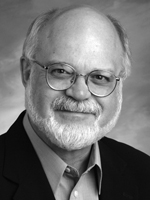
Dr. John G. Hildebrand earned his A.B. degree at Harvard College in 1964 and his Ph.D. at Rockefeller University in 1969. Following postdoctoral work at Harvard Medical School, he joined the faculty of its Department of Neurobiology in 1972. In 1980, he was appointed professor of biological sciences at Columbia University in New York.
In 1985, he moved to the University of Arizona as founding director of the Arizona Research Laboratories Division of Neurobiology, an organized-research unit dedicated to the neurobiology and behavior of insects, and as professor of neurobiology, biochemistry, entomology, and molecular and cellular biology. In 1988, he co-founded the Center for Insect Science at Arizona, and in 1989 he was named regents professor of neurobiology. Throughout his career, Dr. Hildebrand’s research has focused on the functional organization, neurophysiology, neurochemistry, and development of the insect olfactory system, the roles of olfaction in insect behavior, and the chemical ecology of insect-host interactions.
He has served as mentor for 46 postdoctoral associates, 11 Ph.D. students, and 57 undergraduate research students. He has been an editor for four books and has published about 190 research papers, reviews, and book chapters.
He has received numerous awards, including Claude Pepper and MERIT Awards from NIH, the Wright Award in Olfactory Research, the Max Planck Research Award, the ESA Founders’ Memorial Award, an Alexander-von-Humboldt Foundation Research Prize, the Silver Medal of the International Society of Chemical Ecology, an honorary degree from the University of Cagliari (Italy), and an Einstein Professorship in the Chinese Academy of Sciences. He has also been elected to the U.S. National Academy of Sciences, the American Academy of Arts and Sciences, the German Academy of Sciences Leopoldina, and the Norwegian Academy of Science and Letters.
He has served as president of the Association of Neuroscience Departments and Programs, the International Society for Neuroethology, the International Society for Chemical Ecology, and the Association for Chemoreception Science, and he has served as an officer of the Society for Neuroscience and the International Brain Research Organization. He is an elected fellow of the Royal Entomological Society (UK) and of the American Association for the Advancement of Science.
(updated September, 2008)
